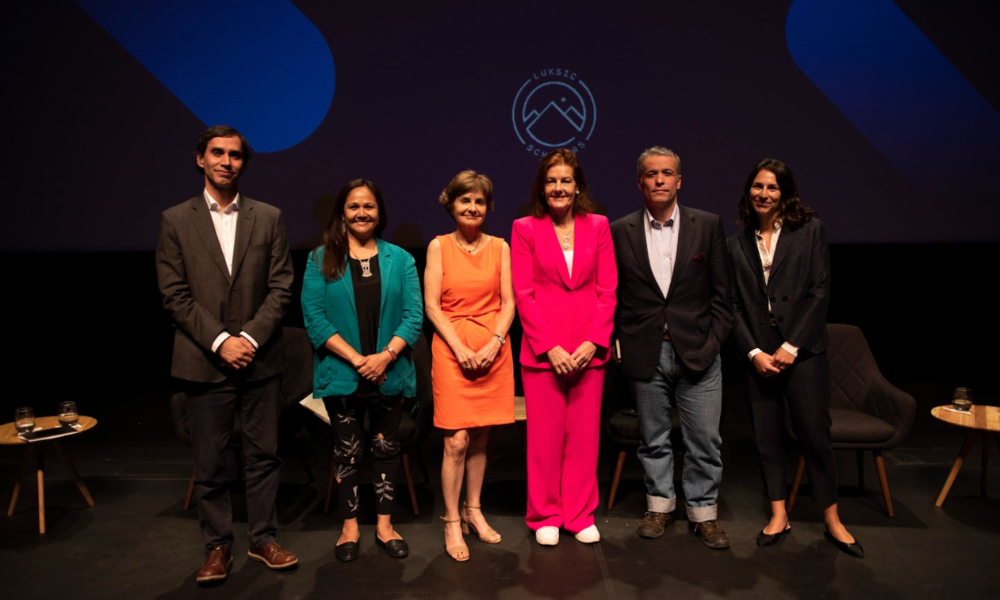The polarization of society, the current stability of democracies, and the role of academia in promoting dialogue and the search for joint solutions were some of the topics addressed during the panel featuring Paula Daza, Verónica Figueroa Huencho, Óscar Landerretche, and Sebastián Soto.
A platform to discuss the importance of consensus in an increasingly polarized world and the role of academia in promoting the search for joint solutions was the “Global Paths: Seeking Common Ground” conference organized by the Luksic Foundation through Luksic Scholars. The event brought together about 400 participants, including authorities, academics, and various professionals from the public and private sectors.
Is consensus necessary? Can agreements be reached without parties abandoning their convictions? And how do we avoid stagnation in a polarized democracy? These were some of the questions addressed during the conference, held in-person and via streaming, with participants from different regions of the country and abroad.
“We want to understand what is happening in the world and provide tools to contribute to the exchange of ideas and personal development,” said Isabella Luksic at the beginning of the conference. The general manager of the Luksic Foundation also explained that the organization’s purpose is focused on contributing to the development of Chile through the education of individuals. This event, in particular, arises from the belief that academia plays a significant role in promoting the development of countries, and international experiences can foster enriching and constructive knowledge exchanges.
The main presentation was delivered by Ngaire Woods, dean and founder of the Blavatnik School of Government at the University of Oxford. “Polarization is taking place worldwide, societies are fracturing, and they are not sharing, and that should concern us,” noted the expert in her talk. Regarding the role of universities and education in this challenge, the dean emphasized, “It is essential that we teach our students how to converse, to have discussions. At the end of the day, we can agree to disagree.”
Following Ngaire Woods’s presentation, a panel discussion featuring Óscar Landerretche, economist and academic at UCHILE; Paula Daza, former Undersecretary of Public Health and executive director of the Center for Public Policy and Innovation in Health at UDD (CIPS-UDD); Verónica Figueroa, academic at the Institute of Public Affairs at UCHILE; and Sebastián Soto, associate professor at the Department of Public Law, UC, and vice president of the Expert Commission, took place.
Both Verónica Figueroa and Sebastián Soto are members of the Luksic Scholars Community, being part of the more than 1,800 individuals who have completed academic programs supported by the Foundation in collaboration with universities worldwide.
Paths to Achieving Agreements
One of the points addressed was the possibility of reaching consensus in a polarized society and the crisis of democratic institutions. In this regard, economist Oscar Landerretche stated, “I think that setting the requirement of achieving consensus for the problems we are facing in our society is too high a standard. I prefer the word agreements, contracts.”
Various processes that Chile has experienced in recent years, such as the social outbreak and the recent constitutional plebiscite, were discussed during the event. Paula Daza, the former Undersecretary of Public Health, commented, “We have common objectives; we are concerned about contributing to our country, providing solutions to Chile. This allows us to reach consensus. The pandemic taught us a lot in that regard. I believe consensus is possible.”
Verónica Figueroa highlighted that as a country, “we are coming out of processes that allowed us to discuss, reflect, and dream of the country we want. It is essential for university spaces to be places of reflection. I think today we have important challenges that we can focus on the dreams of the institutional framework we want for the country,” commented Figueroa.
Sebastián Soto mentioned that “in the future, democracies face the great challenge of governance. Consensus is essential since one builds transactions and contracts on consensus. But we have to have a common ground. It won’t be unanimity, but fundamental values that must be shared over time.”
Additionally, within the framework of the “Global Paths: Seeking Common Ground” event, two programs aimed at academics, researchers, and professionals in the public service field will take place. The programs are the “Case Method for Public Policy Workshop,” developed by the Blavatnik School of Government at the University of Oxford, and “Negotiating Across Differences: Concepts, Strategies, and Tools,” implemented by the Harvard Kennedy School at Harvard University.

